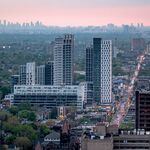JasonParis
Moderator
Montreal a backwater burg? The politicians don't seem to mind
KONRAD YAKABUSKI
May 3, 2007 at 6:03 AM EDT
MONTREAL — Jean Drapeau left Montreal in debt and permanently traumatized by his legacy of white elephants, hideous urban planning and one-man government. But he sure as heck put his city on the map.
That was painfully clear last week as nostalgic Montrealers lived it up like it was 1967 all over again. Only it's not. And 40 years after the magic of Expo 67 made Montreal a global hot spot, a prototype for the 21st-century city, the Quebec metropolis is mired in a crisis of confidence.
Montreal is the slowest-growing major city in Canada. It's at the bottom of the heap in per capita income among the continent's most populous agglomerations. Its infrastructure is literally crumbling and its cultural institutions, through no fault of their own, have become unremarkable and second-rate compared with Toronto's better-financed museums, theatres and concert halls.
When Simon Anholt, a British expert in location branding, arrived in Montreal last year, he thought he'd landed in Kazakhstan. A few months ago, the head of the city's tourism promotion agency said Montreal was dirty and ugly and an increasingly tough sell. Forget Expo-sized aspirations. These days, Montrealers just dream of being able to drive to work without wrecking their alignment or taking the bus without getting whiplash, so wide, deep and prolific are the city's potholes.
Oh, sure, Montreal is still edgy and artsy. Its dynamic street life is still unrivalled in Canada, possibly on the planet. But a city cannot live on Arcade Fire alone. Montreal needs some economic heat, too. Without it, decline is inevitable.
How does Montreal avoid becoming Pittsburgh - with better restaurants?
Mayor Gérald Tremblay has a blueprint. He calls it Montréal 2025, that being the target date for making the city one of the continent's most prosperous. The plan has three major focuses: on fostering a knowledge-based economy, transforming a seedy part of downtown into a hub for the arts, and redeveloping a vast swath of the city's waterfront. There's also a $10-billion plan to replace the city's leaky, century-old pipes and $3.4-billion to patch the roads.
It's an apple-pie vision. But then again, Mr. Tremblay is an apple-pie kind of guy. He's so conscientious, his idea of a business lunch is not the table d'hôte at Toqué, but Wendy's Chili, which he expensed 17 times last year. One working dinner for the Mayor and three advisers cost taxpayers an outrageous $21.53. You get the picture.
But Montreal's problems are so much bigger than its mayor. It's got terrible demographics, with the oldest population and fewest university grads on the continent. It's hopelessly overgoverned, with a city hall and 64 councillors, 19 boroughs with separate councils, and an agglomeration council. It's broke, with a finite revenue base that puts all of the tax burden on property owners. And, worst of all, it gets no respect from the provincial government, its ultimate master.
In February, Mr. Tremblay pleaded for more fiscal flexibility, explaining that without the ability to diversify (and no doubt increase) its tax base, Montreal faced a budget deficit of almost $300-million next year and $700-million by 2013. Why for, instance, does Montreal have to pay to clean up the mess from the Jazz Fest, when Quebec (and Ottawa) reap all the sales taxes on the souvenir mugs and T-shirts?
Mr. Tremblay hoped to get an answer from Jean Charest when the Premier gave a campaign speech before the Board of Trade in March.
Nada. The mayor was downtrodden. But he shouldn't have been surprised. Mr. Charest, who admittedly is not exactly flush, has governed since 2003 as if Montreal was a distraction, rather than the economic engine of the province. Two long-promised mega-hospitals - a key component of the knowledge-based economy Mr. Tremblay dreams of - are only marginally closer to realization now than they were when Mr. Charest first took office.
Then again, when Mr. Charest has paid attention to Montreal - for instance, by undoing a 2001 amalgamation and allowing 14 boroughs to "separate" from Montreal in 2005 - it's hardly been to the mayor's advantage.
Montreal's electoral map has for so long been etched in stone - the city's west-end ridings vote Liberal, the east end for the Parti Québécois - that politicians have nothing to lose by snubbing the city's mayor. Quebec's hard-up regions (that is, everything outside Montreal) are a fixation for the provincial government. Reduced to a minority and essentially shut out of rural Quebec in the March election, Mr. Charest's Liberals are hardly going to change that now.
The next provincial election will not be won or lost on the Island of Montreal. But Montreal will undoubtedly be the loser.
kyakabuski@globeandmail.com
COMMENTS can be viewed here.
KONRAD YAKABUSKI
May 3, 2007 at 6:03 AM EDT
MONTREAL — Jean Drapeau left Montreal in debt and permanently traumatized by his legacy of white elephants, hideous urban planning and one-man government. But he sure as heck put his city on the map.
That was painfully clear last week as nostalgic Montrealers lived it up like it was 1967 all over again. Only it's not. And 40 years after the magic of Expo 67 made Montreal a global hot spot, a prototype for the 21st-century city, the Quebec metropolis is mired in a crisis of confidence.
Montreal is the slowest-growing major city in Canada. It's at the bottom of the heap in per capita income among the continent's most populous agglomerations. Its infrastructure is literally crumbling and its cultural institutions, through no fault of their own, have become unremarkable and second-rate compared with Toronto's better-financed museums, theatres and concert halls.
When Simon Anholt, a British expert in location branding, arrived in Montreal last year, he thought he'd landed in Kazakhstan. A few months ago, the head of the city's tourism promotion agency said Montreal was dirty and ugly and an increasingly tough sell. Forget Expo-sized aspirations. These days, Montrealers just dream of being able to drive to work without wrecking their alignment or taking the bus without getting whiplash, so wide, deep and prolific are the city's potholes.
Oh, sure, Montreal is still edgy and artsy. Its dynamic street life is still unrivalled in Canada, possibly on the planet. But a city cannot live on Arcade Fire alone. Montreal needs some economic heat, too. Without it, decline is inevitable.
How does Montreal avoid becoming Pittsburgh - with better restaurants?
Mayor Gérald Tremblay has a blueprint. He calls it Montréal 2025, that being the target date for making the city one of the continent's most prosperous. The plan has three major focuses: on fostering a knowledge-based economy, transforming a seedy part of downtown into a hub for the arts, and redeveloping a vast swath of the city's waterfront. There's also a $10-billion plan to replace the city's leaky, century-old pipes and $3.4-billion to patch the roads.
It's an apple-pie vision. But then again, Mr. Tremblay is an apple-pie kind of guy. He's so conscientious, his idea of a business lunch is not the table d'hôte at Toqué, but Wendy's Chili, which he expensed 17 times last year. One working dinner for the Mayor and three advisers cost taxpayers an outrageous $21.53. You get the picture.
But Montreal's problems are so much bigger than its mayor. It's got terrible demographics, with the oldest population and fewest university grads on the continent. It's hopelessly overgoverned, with a city hall and 64 councillors, 19 boroughs with separate councils, and an agglomeration council. It's broke, with a finite revenue base that puts all of the tax burden on property owners. And, worst of all, it gets no respect from the provincial government, its ultimate master.
In February, Mr. Tremblay pleaded for more fiscal flexibility, explaining that without the ability to diversify (and no doubt increase) its tax base, Montreal faced a budget deficit of almost $300-million next year and $700-million by 2013. Why for, instance, does Montreal have to pay to clean up the mess from the Jazz Fest, when Quebec (and Ottawa) reap all the sales taxes on the souvenir mugs and T-shirts?
Mr. Tremblay hoped to get an answer from Jean Charest when the Premier gave a campaign speech before the Board of Trade in March.
Nada. The mayor was downtrodden. But he shouldn't have been surprised. Mr. Charest, who admittedly is not exactly flush, has governed since 2003 as if Montreal was a distraction, rather than the economic engine of the province. Two long-promised mega-hospitals - a key component of the knowledge-based economy Mr. Tremblay dreams of - are only marginally closer to realization now than they were when Mr. Charest first took office.
Then again, when Mr. Charest has paid attention to Montreal - for instance, by undoing a 2001 amalgamation and allowing 14 boroughs to "separate" from Montreal in 2005 - it's hardly been to the mayor's advantage.
Montreal's electoral map has for so long been etched in stone - the city's west-end ridings vote Liberal, the east end for the Parti Québécois - that politicians have nothing to lose by snubbing the city's mayor. Quebec's hard-up regions (that is, everything outside Montreal) are a fixation for the provincial government. Reduced to a minority and essentially shut out of rural Quebec in the March election, Mr. Charest's Liberals are hardly going to change that now.
The next provincial election will not be won or lost on the Island of Montreal. But Montreal will undoubtedly be the loser.
kyakabuski@globeandmail.com
COMMENTS can be viewed here.




